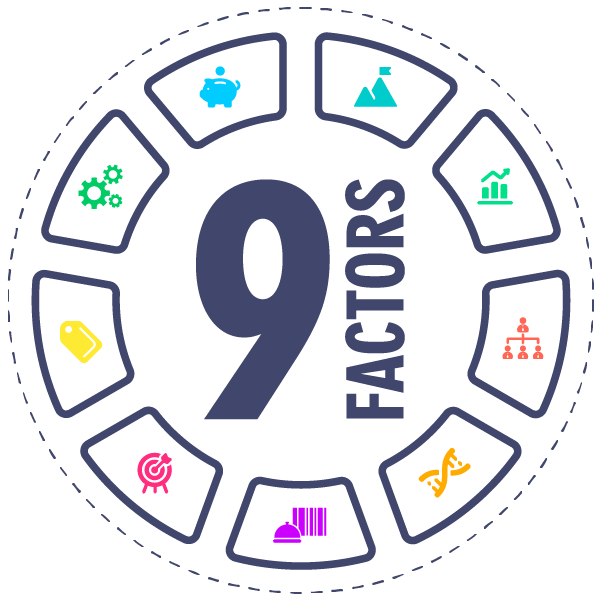Live life without boundaries.
Are you ready to kick start your new life and change your future?
How do you create a successful small business that can run independent of you?
No matter how big, or how small your business, there are 9 Factors to consider to ensure you are building an asset.
Building a business that is independent of the owner is critical. Otherwise you have built yourself a job – a job you can’t quit overnight due to responsibilities and commitments to fulfil.
As Michael Gerber of E-Myth says, “Just because you understand the technical work of a business, doesn’t mean you can successfully run a business that does the technical work”. Being great at what you do – outstanding even – does not mean you can be successful in business.
You have to walk before you can run. Mastering the fundamentals makes creating a scalable business so much more efficient.
Our goal with the 9 Factors of Success is to help you learn the key areas you need to master in your business so you can:
- Create a small business that is independent from you; and
- Spend your time doing things you choose to.


Factor 1 – Leadership
Why are you in business? What do you want to get out of it? How will you communicate your vision and lead your team? And, how will you know when you’ve reached your goals? These are four critical questions asked of small business leaders.
Taking it one step further, how will you use the cash from your business to build the personal life of your dreams? You should aim to use your business to provide for your day-to-day living and create financial independence.
Tying your personal goals to your business goals will help you reach your goals faster. But to get there you have to know what you want.
Small business can make you big money if you can identify and mitigate the issues that hold small business back. A big part of that is small business thinking. Don’t let limiting beliefs hold you back. Change your mindset, change your business and think big!

Factor 2 – Management
What gets measured gets done. Small business owners rarely have the resources to capture extensive data with no end outcome or use.
What 5-10 key things matter most in your business? If these are the key drivers of your client and team satisfaction and profitability, you need metrics for each. With metrics, you can measure, manage, and communicate results. They also help align your systems and people with your business goals.

Factor 3 – People & Culture
Small business teams can be close like family but at the heart of it, employees are there to make the business run. But that doesn’t mean you can’t have fun. Set boundaries by providing your staff with your business vision. They will either find it uncomfortable and move on – or they stay and thrive.
Accountability is an essential part in the day-to-day role of any employee, so finding A-Players is essential. But what if you can’t afford to pay competitive salaries? How can you find and develop the best people for your business? How do you become a workplace that attracts and retains A-Players?
Being able to identify the right staffing mix and tools to keep everyone aligned is a big part of managing the people and culture in your business.
But this isn’t all about your team. Self leadership and liberating you from your business using systems and training is also important.

Factor 4 – Brand
Brand is more than just your corporate colours, logo and website. Your brand speaks to who you are as a business, the nature of your product or service, and the standards you maintain for those who expeirence it.
How can you build predictability into making your brand promise, and delivering on that promise – every single time?
Michael Gerber says, “The commodity isn’t what’s important — the way it’s delivered is.”
The ability to see the business from a customer’s perspective, and not your own, is invaluable.

Factor 5 – Product
Without a product (physical, service or digital) you don’t have a business. Your business is also more than the commodity you sell. When thinking about the services and products you supply, what is the experience you have built around servicing your clients? This ties directly into your brand.
How do you establish your pre-eminence in the market place? Being clear on what you are selling helps customers understand your point of difference from competition.
Do you have a clear path for your own clients to get to know you, and build enough trust in you to buy something? Have you developed marketing assets that work for you and support your products? Does your entire team know and understand what you sell?

Factor 6 – Marketing
This is about making your business known. You can use traditional media such as print, radio and television, as well as new media like digital marketing and social channels.
Before you can scale your business you need to have the right foundations in place. Fast growth without the foundations in place leads to problems and can derail your success.
Does your marketing produce predictable and consistent results week after week? Do you have an overarching strategy for customer acquisition and conversion? Or, are you running a mix of different tactics?
What marketing assets do you have in place that can run 24/7 and consistently produce results?

Factor 7 – Sales & Delivery
This is closely aligned with Factor 6. This is where customer service and operations come together to serve the client.
The sales process is not about closing – it is about building a long-term relationship with a new client so you can help them achieve their goals.
These two disciplines are grouped together as the promises made by your sales team must be delivered through your fulfilment systems. This is critical otherwise you will not deliver on your brand promise.

Factor 8 – Operations
Operations cover the practical areas of servicing your client and the back-end systems to make your business work. What facilities do you use or need to have access to? How are you insured?
If you manufacture or hold inventory there are many other considerations you need to take into account. Factor in buying/making decisions, stock levels, trends and changes. Your supplier selection and contract management processes are also important. Compliment your operations with a risk management plan as supply chain issues can break your business.

Factor 9 – Finance
Without cash flow the business will die. Managing cash flow is one of the single largest stress points.
Being proportional is key. There is no point having a 4-week project to develop a cash budget when you won’t look at it again for the next 12 months.
How do you get money when the bank won’t lend it to you? You need to think outside of the box, which is where Alternative Finance comes in.
Small business owners need to see profit as the driving force, and themselves as entrepreneurs – not just as technical experts.
We believe in having effective communication pathways between operations, technical and corporate/leadership teams. The reason is so the corporate intent is delivered through the on the ground workers.
Mastering the 9 Factors of your business will show you how to turn your company into a money machine.
Our goal is to give you information and ideas you can put in place today, so you can overcome long standing problems in your small business.
At sixty:forty we want to transform the way that small business owners grow their companies.
Do you want to just get by in business … or do you want to build your business into what you know it can be?
Join us on our goal to help 10,000 small business owners to double their net profit and cut their time working in the business by 31 December 2022.

